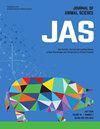Dietary fibre and weaning age affect stress and immune markers in saliva of sows and their offspring
IF 2.7
2区 农林科学
Q1 AGRICULTURE, DAIRY & ANIMAL SCIENCE
引用次数: 0
Abstract
Diet, especially the intake of dietary fibre, and weaning practices may influence pig wellbeing. This study assessed changes in salivary stress and immune markers in sows and their offspring fed either hay (HAY) or sugar beet pulp (SBP), either fine (F) or coarse (C), during gestation and lactation. The effect of weaning age (conventional-CW, late-LW) on these markers was also evaluated. Saliva was analysed for chromogranin A (CgA), cortisol, alpha-amylase, oxytocin, immunoglobulin A (IgA) and adenosine deaminase (ADA). CgA was higher at CW vs. LW in sows fed SBP-F (P=0.038). Alpha-amylase was higher in sows fed HAY-C at CW vs. LW (P=0.005) and in sows fed SBP-C at LW vs. CW (P=0.096). CgA and oxytocin were higher in sows fed SBP-F at CW vs. LW (P =0.038 and P =0.017, respectively). ADA was higher in sows fed SBP-C vs. HAY-C (P=0.035) at LW and at LW vs. CW in sows fed SBP-C (P=0.002). Piglet salivary CgA was higher at CW vs. LW in HAY-F (P=0.002) and SBP-F (P=0.031). Oxytocin was higher at CW vs. LW in piglets fed HAY-F (P=0.006). Piglet salivary IgA was higher in HAY-C vs. HAY-F at CW (P=0.010) and at LW vs. CW in piglets fed HAY-F (P=0.021). ADA was higher in piglets fed SBP-F vs. HAY-F (P=0.053) at CW and SBP-F vs. SBP-C (P=0.042) at LW. Dietary fibre type, weaning age and to a lesser extent grinding degree affect stress and immune markers in pigs. These findings highlight the impact of diet and weaning practice on pig welfare.膳食纤维和断奶年龄影响母猪及其后代唾液中的应激和免疫标记物
饮食(尤其是膳食纤维的摄入量)和断奶方法可能会影响猪的健康。本研究评估了妊娠期和哺乳期饲喂干草(HAY)或甜菜浆(SBP)(细纤维(F)或粗纤维(C))的母猪及其后代唾液应激和免疫指标的变化。此外,还评估了断奶年龄(常规-CW、晚断奶-LW)对这些标记物的影响。对唾液中的嗜铬粒蛋白 A (CgA)、皮质醇、α-淀粉酶、催产素、免疫球蛋白 A (IgA) 和腺苷脱氨酶 (ADA) 进行了分析。饲喂 SBP-F 的母猪在 CW 和 LW 时 CgA 较高(P=0.038)。饲喂 HAY-C 的母猪α-淀粉酶 CW 值比 LW 值高(P=0.005),饲喂 SBP-C 的母猪α-淀粉酶 LW 值比 CW 值高(P=0.096)。饲喂 SBP-F 的母猪 CgA 和催产素分别高于饲喂 CW 和 LW 的母猪(P=0.038 和 P=0.017)。饲喂 SBP-C 与 HAY-C 的母猪在 LW 期的 ADA 较高(P=0.035),饲喂 SBP-C 的母猪在 LW 期与 CW 期的 ADA 较高(P=0.002)。饲喂 HAY-F 和 SBP-F 的母猪,仔猪唾液中的 CgA 在 CW 和 LW 时均高于 HAY-C(P=0.002)和 SBP-C(P=0.031)。饲喂 HAY-F 的仔猪在 CW 与 LW 时的催产素较高(P=0.006)。饲喂 HAY-F 的仔猪在 CW(P=0.010)和 LW(P=0.021)时,HAY-C 和 HAY-F 的仔猪唾液 IgA 分别高于 CW(P=0.010)和 LW(P=0.021)。饲喂 SBP-F 与饲喂 HAY-F 的仔猪在 CW 期的 ADA 较高(P=0.053),饲喂 SBP-F 与饲喂 SBP-C 的仔猪在 LW 期的 ADA 较高(P=0.042)。日粮纤维类型、断奶日龄以及较小程度的磨碎程度都会影响猪的应激和免疫指标。这些发现凸显了日粮和断奶方法对猪福利的影响。
本文章由计算机程序翻译,如有差异,请以英文原文为准。
求助全文
约1分钟内获得全文
求助全文
来源期刊

Journal of animal science
农林科学-奶制品与动物科学
CiteScore
4.80
自引率
12.10%
发文量
1589
审稿时长
3 months
期刊介绍:
The Journal of Animal Science (JAS) is the premier journal for animal science and serves as the leading source of new knowledge and perspective in this area. JAS publishes more than 500 fully reviewed research articles, invited reviews, technical notes, and letters to the editor each year.
Articles published in JAS encompass a broad range of research topics in animal production and fundamental aspects of genetics, nutrition, physiology, and preparation and utilization of animal products. Articles typically report research with beef cattle, companion animals, goats, horses, pigs, and sheep; however, studies involving other farm animals, aquatic and wildlife species, and laboratory animal species that address fundamental questions related to livestock and companion animal biology will be considered for publication.
 求助内容:
求助内容: 应助结果提醒方式:
应助结果提醒方式:


